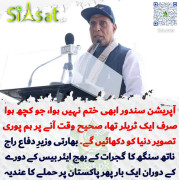Night_Hawk
Siasat.pk - Blogger
[h=1]Why you should avoid popping pills in the long term[/h] Alina Islam Updated May 18, 2015

If someone were to observe me at a grocery store, they would probably find my behaviour a little bit odd. I analyze ingredient labels for ages, put most things back and either scoff like a food snob or shake my head disapprovingly.
As a holistic nutritionist, I cant help it; its the same way dentists probably scrutinize the teeth of everyone they meet and make a daily dua for their spouses to start flossing.
But for the longest time, there was one thing I did not scrutinize medication.
I would find myself casually popping pills here and there for a cold, a headache or stomach cramps, never once stopping to read the ingredient label. After all, medicine was a wonderful friend to me; an ever reliable safety net that was there to catch me every time I fell even slightly ill.
It wasnt until I saw the chart below that my attitude changed and I started to inspect pharmaceutical drugs the way I did food. The chart shows the risk of death due to x incident relative to the risk of being killed in a Boeing 747*.
[TABLE="class: media one-half palm--one-whole media--right media--uneven"]
[TR]
[/TR]
[/TABLE]
[TABLE="class: media one-half palm--one-whole media--right media--uneven"]
[TR]
[TD="class: media__caption"]
[/TD]
[/TR]
[/TABLE]
As you can see, adverse drug reactions made it to the top 10 list, ranking higher than lung, breast and prostate cancer, diabetes, and even car accidents. Natural healthcare and therapeutic products came in second to last, right above the risk of being hit by a meteorite.
How could something thats supposed to heal me be riskier than cancer? It didnt make any sense.
Over the next few weeks, I started to look up the side effects in detail for as many pharmaceutical drugs as I could on websites such as drugs.com. Some of them left me utterly gobsmacked.
For example, a popular anti-depressant drug called Cipralex lists side effects such as abnormal dreams, difficulty in concentrating, emotional indifference, hallucinations, headaches, overactive behaviors or thoughts, and restlessness.
I understand that these side effects may only occur for some people, but arent they counterproductive to the reason for taking the drug in the first place?
Wouldnt someone depressed feel that much worse?
The more I looked around, the more I found others who felt the same. In fact, I found out that Deepak Chopra used to be chief of medicine at Boston Regional Medical Center, and it was the reliance on prescription drugs that made him resign and create his own alternative-medicine-based wellness center. I suspect what Chopra learned, as did I, is that most drugs are designed to offer a Band-Aid solution; fast, temporary relief, only until the symptoms rear their ugly head again.
To paint a picture, Id like you to think of someone you know who has been taking medication for a long time whether for high blood pressure, diabetes or any other condition and ask yourself, has that person healed? Or have they passively accepted their condition as one that cannot be fixed; repeatedly buying the same medication over and over again?
[h=5]There is a way to minimize the dependency on prescription drugs, and that is through food.[/h]
Both drugs and food are taken orally, end up in the bloodstream and enter our cells; so it irks me that the capacity of the latter to heal us sounds laughable to some.
The difference between the two is that food has nutrients, while drugs do not provide these raw materials we need to build our cells. Moreover, food does not come with a pamphlet of side effects or make a big dent in the wallet. Of course, depending on the persons condition, there may need to be a healthy balance of both, but that balance cannot be found if the basics of good nutrition, exercise and quality sleep are refused or ignored.
I therefore urge you to tap the innate medicinal properties of food, herbs and spices that nature provides us, or even the profound effects of exercise. If you are a skeptic, do your research until you find the scientific explanation behind the alternative approach or a home remedy.
For example, most of us grew up being told to put haldi on a wound. Haldi helps because the active component, curcumin, is anti-inflammatory, antibacterial, and has analgesic qualities, which helps relieve pain.
Remember, just because a particular spice, herb or food does not have corporate-backed research worth millions of dollars, it does not mean there is no scientific explanation behind its benefits. It means there is lack of interest in pursuing the research.
Fortunately, due to the growing presence of natural supplements globally, companies are now able and willing to prove the efficacy of say, curcumin, for conditions such as arthritis or Alzheimers.
Of course, even in light of this information, I know that drugs can save lives, help people with chronic conditions or disabilities live a normal life, and provide fast relief when needed. I will still take a pill when its absolutely necessary and I am grateful that such drugs exist.
But what I got out of this investigation was a shift in perspective towards Western medicine a degree of disenchantment perhaps and a new-found respect for the healing powers of natural medicine.
So if youd like to try out an alternative approach, and it does not conflict with existing medication you are on (which, by the way is extremely rare), keep in mind that its as risky as getting hit by a meteorite.
Note: Please do not attempt to get off long-term medication for serious illnesses and chronic conditions without consulting your doctor or pharmacist.
[h=5]A list of my favourite natural remedies:[/h]

Source

If someone were to observe me at a grocery store, they would probably find my behaviour a little bit odd. I analyze ingredient labels for ages, put most things back and either scoff like a food snob or shake my head disapprovingly.
As a holistic nutritionist, I cant help it; its the same way dentists probably scrutinize the teeth of everyone they meet and make a daily dua for their spouses to start flossing.
But for the longest time, there was one thing I did not scrutinize medication.
I would find myself casually popping pills here and there for a cold, a headache or stomach cramps, never once stopping to read the ingredient label. After all, medicine was a wonderful friend to me; an ever reliable safety net that was there to catch me every time I fell even slightly ill.
It wasnt until I saw the chart below that my attitude changed and I started to inspect pharmaceutical drugs the way I did food. The chart shows the risk of death due to x incident relative to the risk of being killed in a Boeing 747*.
[TABLE="class: media one-half palm--one-whole media--right media--uneven"]
[TR]
[/TR]
[/TABLE]
[TABLE="class: media one-half palm--one-whole media--right media--uneven"]
[TR]
[TD="class: media__caption"]
[/TD]
[/TR]
[/TABLE]
As you can see, adverse drug reactions made it to the top 10 list, ranking higher than lung, breast and prostate cancer, diabetes, and even car accidents. Natural healthcare and therapeutic products came in second to last, right above the risk of being hit by a meteorite.
How could something thats supposed to heal me be riskier than cancer? It didnt make any sense.
Over the next few weeks, I started to look up the side effects in detail for as many pharmaceutical drugs as I could on websites such as drugs.com. Some of them left me utterly gobsmacked.
For example, a popular anti-depressant drug called Cipralex lists side effects such as abnormal dreams, difficulty in concentrating, emotional indifference, hallucinations, headaches, overactive behaviors or thoughts, and restlessness.
I understand that these side effects may only occur for some people, but arent they counterproductive to the reason for taking the drug in the first place?
Wouldnt someone depressed feel that much worse?
The more I looked around, the more I found others who felt the same. In fact, I found out that Deepak Chopra used to be chief of medicine at Boston Regional Medical Center, and it was the reliance on prescription drugs that made him resign and create his own alternative-medicine-based wellness center. I suspect what Chopra learned, as did I, is that most drugs are designed to offer a Band-Aid solution; fast, temporary relief, only until the symptoms rear their ugly head again.
To paint a picture, Id like you to think of someone you know who has been taking medication for a long time whether for high blood pressure, diabetes or any other condition and ask yourself, has that person healed? Or have they passively accepted their condition as one that cannot be fixed; repeatedly buying the same medication over and over again?
[h=5]There is a way to minimize the dependency on prescription drugs, and that is through food.[/h]
Both drugs and food are taken orally, end up in the bloodstream and enter our cells; so it irks me that the capacity of the latter to heal us sounds laughable to some.
The difference between the two is that food has nutrients, while drugs do not provide these raw materials we need to build our cells. Moreover, food does not come with a pamphlet of side effects or make a big dent in the wallet. Of course, depending on the persons condition, there may need to be a healthy balance of both, but that balance cannot be found if the basics of good nutrition, exercise and quality sleep are refused or ignored.
I therefore urge you to tap the innate medicinal properties of food, herbs and spices that nature provides us, or even the profound effects of exercise. If you are a skeptic, do your research until you find the scientific explanation behind the alternative approach or a home remedy.
For example, most of us grew up being told to put haldi on a wound. Haldi helps because the active component, curcumin, is anti-inflammatory, antibacterial, and has analgesic qualities, which helps relieve pain.
Remember, just because a particular spice, herb or food does not have corporate-backed research worth millions of dollars, it does not mean there is no scientific explanation behind its benefits. It means there is lack of interest in pursuing the research.
Fortunately, due to the growing presence of natural supplements globally, companies are now able and willing to prove the efficacy of say, curcumin, for conditions such as arthritis or Alzheimers.
Of course, even in light of this information, I know that drugs can save lives, help people with chronic conditions or disabilities live a normal life, and provide fast relief when needed. I will still take a pill when its absolutely necessary and I am grateful that such drugs exist.
But what I got out of this investigation was a shift in perspective towards Western medicine a degree of disenchantment perhaps and a new-found respect for the healing powers of natural medicine.
So if youd like to try out an alternative approach, and it does not conflict with existing medication you are on (which, by the way is extremely rare), keep in mind that its as risky as getting hit by a meteorite.
Note: Please do not attempt to get off long-term medication for serious illnesses and chronic conditions without consulting your doctor or pharmacist.
[h=5]A list of my favourite natural remedies:[/h]
- For a sore throat: raw honey; slippery elm or zinc lozenges
- For a cold: boil eucalyptus leaves or one tsp. ginger powder in a quart water and inhale the steam; 1000mg Vitamin C every four hours; lots of sleep
- For indigestion, gas and bloating: herbal teas e.g. ginger, fennel, peppermint, chamomile; drink a small capful of apple cider vinegar in cup water five minutes before meals; avoid mixing heavy starch and heavy protein in a meal
- For constipation: one cup hot water and small lemon on an empty stomach upon waking, followed by a few dates or prunes; one Tbsp. psyllium husk mixed in water or yogurt; one cup hot water with one Tbsp. ground flax before bed
- For a toothache: apply three drops of clove oil to the affected tooth

Source

























